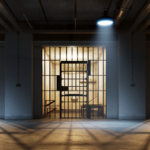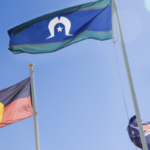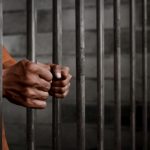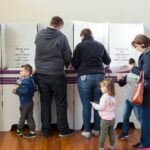NSW Should Extend Voting Rights to All Inmates to Better Serve the Community
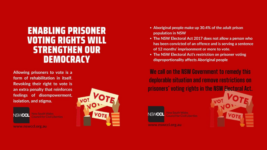
Right now, NSW inmates serving sentences of 12 months or more are denied the ability to vote in state elections, and whilst federally, such restrictions on voting rights also exist, in these cases, the prohibition applies to those sentenced to at least three years inside.
The NSW Council for Civil Liberties, however, doesn’t consider inmates should be denied the right to participate in this basic democratic process, as, not only is this contrary to any rehabilitative outcome detention might serve an inmate, but it also harms society as a whole.
NSWCCL president Lydia Shelley put this proposition to the Administration of the 2023 NSW state election and other matters inquiry last Friday, as the Joint Standing Committee on Electoral Matters considers a range of electoral-related issues in the wake of the March 2023 election.
The council is hardly alone in its calls either. A NSWCCL tweet announcing the inquiry hearing last Friday, included the X handles of committee members from across the political spectrum, and NSW Greens MLC Cate Faerhmann responded to affirm that her party shares the position.
And this issue is not unique to Australia, as similar bans exist around the globe. While these laws go to the heart of the dilemma around the modern correctional facility, as the popular idea is that inmates should be rehabilitated, but this remains an aspiration in regard to most carceral systems.
Deprivation of liberty, not rights
“People sentenced to prison are deprived of their liberty, but they shouldn’t be deprived of their right to have a voice as part of a society that, in the vast majority of cases, they will rejoin,” Shelley said in a statement prior to last Friday’s committee hearing.
“The right to vote is just one of a range of human rights, such as freedom of speech and rights to associate, assemble and protest, that are fundamental to democracy,” the NSWCCL president added. “We should not support governments that seek to exclude certain groups from voting.”
Indeed, a popular misconception exists whereby prison is understood as a place where the incarcerated lose all of their rights. But the truth is the law considers the deprivation of liberty the punishment of an inmate for their wrongdoing, and not unlimited deprivations.
As Shelley notes, prisoners have to rejoin society, and if they have been the subject of grave deprivations, then any aberrant behaviour resulting can cause harm to the community.
So, the denial of voting rights, or disenfranchisement, serves to further isolate the inmate from the rest of the society, and works against the goal of reintegration into it.
“We should not support laws that seek to exclude certain groups from being able to vote,” Shelley underscored. “The NSWCCL considers that as part of a healthy democracy, Australia should fiercely defend the principle of free and equal participation in the political process”.
Civil death
The idea of disenfranchising inmates from voting rights hearkens back to ancient Greece and the concept of the “civil dead”, whereby those who’ve broken the social contract should lose all their rights, especially voting rights, at least for the time of incarceration, and in some cases, for good.
NSW prisoners’ rights group Justice Action has long been pushing for the removal of laws and policies that deny incarcerated people rights on the inside, especially voting rights, as this treatment serves to compound any perception of disengagement from the broader community.
Justice Action coordinator Brett Collins told Sydney Criminal Lawyers a few years back, that the removal of voting rights increases any feelings of disenfranchisement and disempowerment they felt on the outside, and it hardly encourages taking “a functional place in the community” afterwards.
Collins further made clear that it is the responsibility of government to include prisoners in the “political process and encourage them to feel listened to and fully participate.”
Otherwise, he continued, the danger is it “creates an underclass that feels contempt and hostility for those with political power”, and as an end result of this, it causes those who remain excluded to learn to wear their social isolation “as a badge of honour”.
Colonial restraints
Australians are more likely to come across this issue in the press in regard to US voting restrictions placed on inmates, as that nation has a plethora of laws that serve to prevent voting rights whilst in prison, and in some jurisdictions, imprisonment equals disenfranchisement for life.
These US laws, it’s well known, actually serve to prohibit large numbers of Black Americans from voting, as they’re imprisoned at four times the rate of white Americans. And as this situation continues to develop, it can be understood that in some cases, this outcome is by design.
Shelley recalled in her statement last week that “the final report of the 2021 NSW Select Committee on the High Level of First Nations People in Custody and Oversight and Review of Deaths in Custody was tabled in the NSW parliament 30 years after the Royal Commission’s final report was published.”
“Yet, we are no closer to addressing the gross overrepresentation of First Nations people in the criminal justice system,” the lawyer added, as she hit on another key issue underpinning the denial of voting rights, which is it disproportionately affects Aboriginal and Torres Strait Islander peoples.
The NSW Bureau of Crimes Statistics and Research (BOCSAR) pointed out earlier this month that the “latest figures indicate that the Aboriginal imprisonment rate in NSW is nearly 10 times the non-Aboriginal imprisonment rate”.
At the time of last year’s March election, 12,555 people were inside the state’s gaols being denied the right to vote, with 3,709 of them, or 29 percent, being First Nations adults denied the right to participate in a system that has served to dispossess them from their land and ways of being.
However, whilst accounting for a third of the state’s inmates, First Nations people only account for 3.4 percent of the overall NSW population. So, the disproportionate impact of the voting prohibition upon Indigenous people is stark.
As of December, the percentage of First Nations inmates making up the prisoner population now stands at 30 percent, and, as this is in line with a decades-long climb in the proportion of Aboriginal inmates compared to the non-Indigenous, this voting ban is only set to further target First Peoples.
And as politicians are prone to ponder votes, it’s certain that all those taking part in the current parliamentary inquiry are well aware of what these stipulations mean for them.
Contravening international obligations
The Australian Constitution has become increasingly notorious for the dearth of rights protections it provides.
Although, one of the handful of rights that the drafters considered necessary to include was the right to vote, under section 41 of founding document, which provides that all adults who have or have acquired the right to vote, should not be prevented from so doing during elections.
In terms of this denial to prisoners in NSW, this ban sits under section 30(4) of the Electoral Act 2017 (NSW), where it states that “a person is not entitled to be enrolled if the person has been convicted of an offence, whether in NSW or elsewhere, and has been sentenced” to 12 months prison or more.
Within his second reading speech on the 2017 legislation, Liberal MLC Don Harwin outlined that the Berejikilian government hadn’t crafted this law, but was simply remaking an existing law, and he underscored that this was in spite of international laws and obligations considering it inappropriate.
Article 25 of the International Covenant on Civil and Political Rights and article 5 of the International Covenant on the Elimination of Racial Discrimination provide the right to vote to all people, and as the nation is a party to both of these treaties, it’s obligated to abide by them but this is nonbinding.
In relation to a short-lived 2006 Howard government blanket ban on prisoner voting rights, the High Court of Australia held in 2007’s Roach versus the Electoral Commissioner that this was an unlawful contravention of the right extended in the Constitution.
“The NSWCCL is deeply concerned about the unacceptably high level of First Nations people in custody,” Shelley continued. “Enabling people in prison to vote is a small step forward in addressing the enormous disadvantage that First Nations people face.”
“We should be connecting prisoners to society, giving them a stake in their communities’ future. Allowing prisoners to vote is a form of rehabilitation in itself,” the lawyer said in conclusion.
“Revoking their right to vote is an extra penalty that reinforces feelings of disempowerment, isolation and stigma.”



